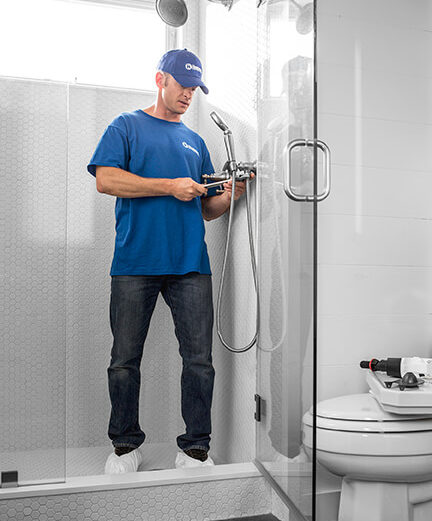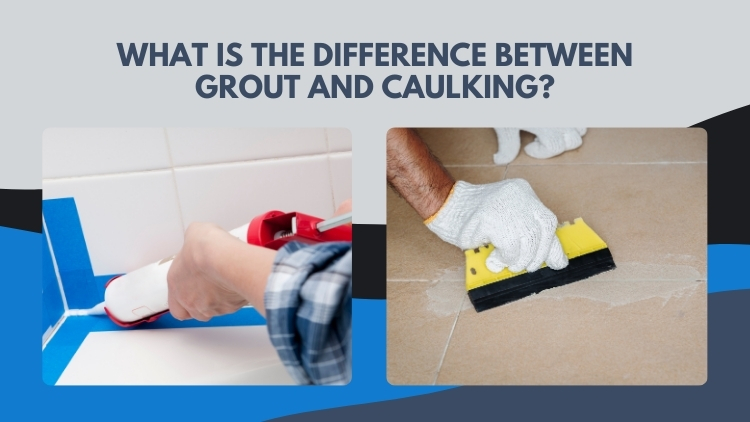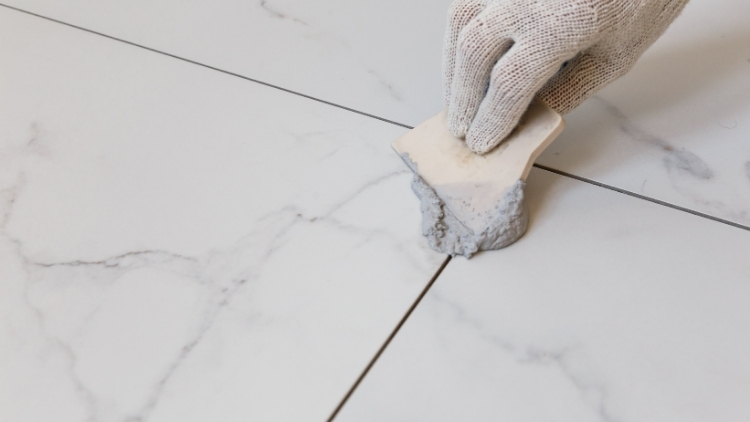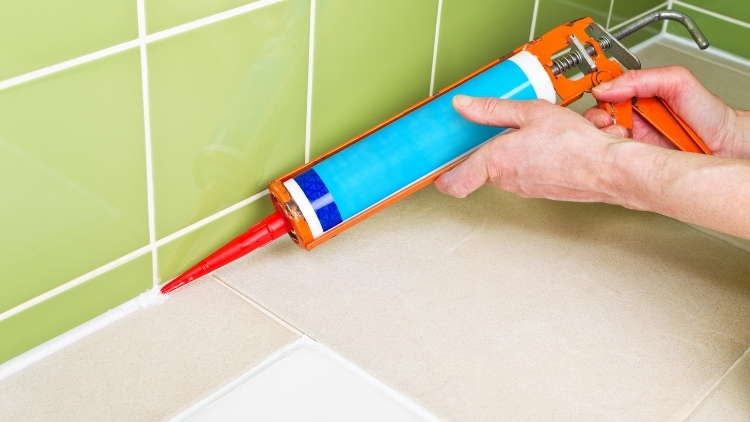We offer a wide range of services for that fresh look, or just maintenance or updates to keep your home functioning and safe. Regardless of the size of the job, we have a craftsman that can tackle it. We offer a wide range of services for that fresh look, or just maintenance or updates to keep your home functioning and safe. Regardless of the size of the job, we have a craftsman that can tackle it.

Maintenance / June 9, 2024

When it comes to home maintenance, you might not immediately think about the differences between grout and caulking, but knowing these distinctions is key to keeping your home looking great and functioning well. Grout is a sturdy blend used to fill spaces between tiles, making it ideal for areas that stay damp, like bathrooms. On the other hand, caulking is designed for flexibility and waterproof seals, perfect for bridging gaps between different surfaces and keeping out moisture and drafts.
Professional handyman services use both materials strategically to get the best results for each unique situation. Their expertise ensures a precise application, so no detail is overlooked. With over three decades of experience in home repair, Handyman Connection Vancouver has answered countless questions about these materials. In our comprehensive guide, we break down the differences between grout and caulk, explain their unique properties, share best practices for their application, and discuss why relying on the pros at Handyman Connection is a smart move for any homeowner.

Grout, a robust cement or epoxy material, is often found nestled between the ceramic or stone tiles, filling in the gaps to create a smooth, unified surface. It’s a mixture of water, cement, sand, and sometimes colour and chemicals that keep the tiles in place while providing a sturdy, water-resistant layer against the wall or floor beneath.
Types of Grout
There are three main types of grout:
Grout is that handy material used to fill the spaces between tiles after they’ve been set and the adhesive has dried. Think of it as the final touch that locks the tiles in place and gives them a bit of extra support. It’s essential for making sure everything stays put and looks great.
Now, when it comes to types of grout, as mentioned above, you’ve got a few options. Cementitious grout is the most common type you’ll encounter. It’s strong and reliable but does require sealing to keep it water-resistant and prevent staining. This means a little bit of maintenance now and then to keep it in top shape.
If you’re looking for something that demands less upkeep, epoxy and furan grout might be your best bet. These are more durable and naturally resistant to moisture and stains, which makes them fantastic choices for high-traffic areas like your bathroom or kitchen floors. You won’t have to worry as much about sealing them, so they’re great if you prefer a more low-maintenance solution.
However, knowing the right type of grout to use and properly applying it can be tricky. That’s where professional handyman services come in. Experts know exactly which grout fits best for different areas of your home, ensuring everything is done right the first time. Handyman Connection Vancouver brings over 30 years of experience to the table, so you can trust us to handle your tiling projects with precision.

Often mistaken for grout, caulk is a flexible, waterproof filler that finds its home in the joints and edges of fixtures. Unlike grout, which is rigid, caulk allows for a degree of movement and expansion, making it perfect for areas that are prone to shifts.
Types of Caulk
Caulk comes in a variety of types, each tailored to specific applications:
When to Caulk
Caulk is like the unsung hero of home maintenance. Unlike grout, which you use between tiles, caulk is perfect for sealing edges around sinks, bathtubs, and fixtures against walls or counters. It’s a finishing touch applied after everything else is installed and any grout has set, helping to create a seamless, watertight seal.
One of the most popular types of caulk is silicone. It’s praised for its long-term durability—it stays flexible and doesn’t crack easily, making it ideal for areas that experience a lot of movement or moisture. However, even the best caulk isn’t entirely maintenance-free. In high-moisture areas like your bathroom, you might need to reapply it occasionally to maintain a tight, waterproof seal. This keeps water from sneaking into crevices where it can cause damage over time.
Using caulk might sound straightforward, but getting a smooth, professional finish can be tricky without the right technique. That’s why many homeowners turn to professionals for help. The pros know how to apply caulk neatly and effectively, ensuring every edge and seam in your home is protected.
At Handyman Connection Vancouver, we’ve mastered the art of caulking with over 30 years of experience in home repair. In our latest blog post, we dive into the details of when and where to use caulk, share tips on achieving that perfect finish, and explain why trusting experienced professionals can make all the difference. Whether you’re fixing up an old bathroom or installing a new kitchen sink, knowing how to properly use caulk will keep your home looking sharp and functioning well for years to come.
While grout and caulk share a common goal of sealing areas against moisture, their differences are stark and significant.
Application Differences: Grout is applied with a rubber float and forced into the tile crevices. Excess grout is then wiped away, leaving an even surface. Caulk, on the other hand, is applied from a caulk gun, usually in a narrow bead, and smoothed with a finger or tool.
Material Properties: Grout is rigid, which makes it perfect for holding tiles in place and providing stability. However, it doesn’t tolerate movement well and can crack if the surface it’s protecting shifts. Caulk, being flexible, doesn’t have this problem.
Aesthetic and Functional Differences: While both enhance the look and performance of tile work, grout fills spaces entirely, ensuring a level surface, whereas caulk remains on the tile’s perimeter and is hidden from plain sight yet is integral for maintaining a water-tight seal in those vital areas.
Both grout and caulk can be found at your local hardware store, and many homeowners are tempted to tackle these tasks themselves. It seems straightforward enough, right? But there’s a big advantage to professional installation, especially when you want long-lasting results.
When you bring in the experts from Handyman Connection, you’re tapping into a wealth of experience built over thousands of successful installations. Our professionals have an eye for detail that ensures grout and caulk are applied correctly, functionally sound, and aesthetically pleasing.
Why is this important? Well, improper application of grout or caulk can lead to a variety of issues. For instance, if the grout isn’t sealed properly, it can absorb moisture, leading to mold and mildew buildup. Similarly, if caulk isn’t applied with precision, it can fail to create a proper seal, resulting in leaks and potential water damage. These problems not only affect the look of your home but can also compromise structural stability over time.
DIY repairs might seem like a cost-effective solution initially, but they can end up costing more in the long run. If not done right, you may have to redo the work or even call in professionals to fix mistakes, doubling what you spend on materials and labour.
Handyman Connection Vancouver takes the guesswork out of the equation. With over 30 years in the business, our team knows the ins and outs of proper grout and caulk application. We ensure that every job is done to the highest standards, saving you time, money, and hassle. So, before you pick up that tube of caulk or bag of grout, consider the peace of mind that comes with professional service. Your home deserves nothing less!
By now, the once-mysterious realm of grout and caulk should feel a little less daunting. Armed with knowledge and a trusted professional, you’re well-equipped to make informed decisions about your home’s maintenance.
Remember, in the hands of a skilled professional, grout and caulk are more than just materials; they’re the invisible linchpins that hold your home together. Trust the experts at Handyman Connection to keep your abode secure, beautiful, and ready to stand the test of time.
Your Next Step to Solid Home Repair
Whether you’re curious about grout and caulk or ready to tackle your next home repair project, Handyman Connection is here to guide you every step of the way. Contact us today to discover the extensive services we offer and take the first step in securing your home’s future.